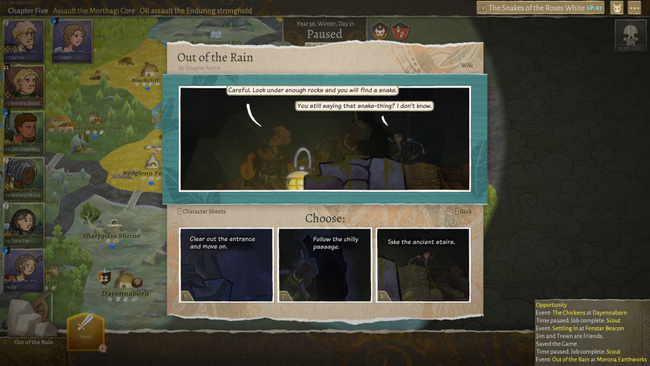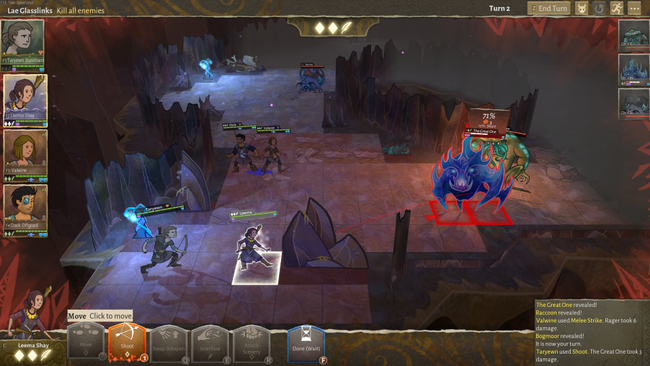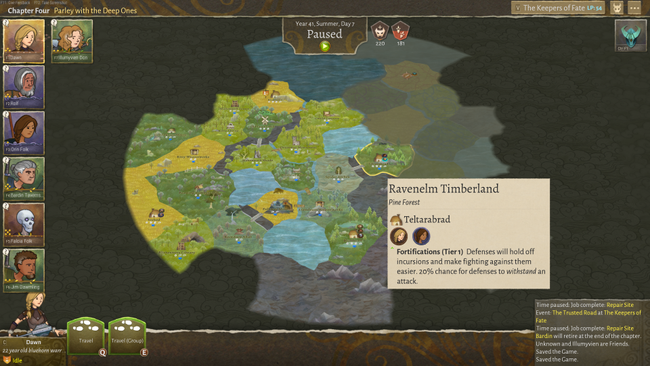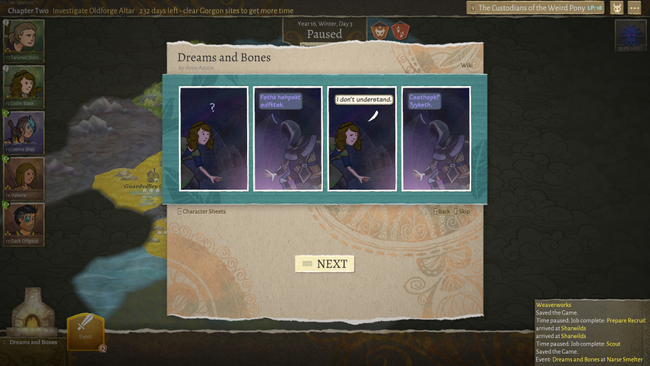
Wildermyth Review
Wildermyth is one of those games I've spotted out of the corner of my eye here & there, and it seemed interesting enough on paper, but with a busy schedule & a small team here at RPG Site, I simply didn't get a chance to check it out when it launched out of Early Access this Summer. However, the word of mouth surrounding this procedurally-generated RPG was so great, I knew I needed to set some time aside to check it out before the year came to a close.
So what is Wildermyth? According to its store page, it is a 'character-driven, procedurally-generated tactical RPG'. I'd probably describe it as something reminiscent of a table-top experience, only with the game itself acting as your DM. It incorporates tactical combat as well, but the game's overall procedural structure is where it primarily makes its mark.
Since it's a bit atypical from most of the RPGs we cover, let me lay it out. How Wildermyth works is like this: at the start of the game, you generate a few characters and pick one of five 'campaigns' to play through, with most of these being five chapters long (a campaign being about 5-10 hours each). Each 'chapter' opens with a bespoke written opening and each chapter ends with a bespoke ending, but everything that happens in between chapter bookends is 'procedural', both in terms of gameplay and writing.

Rather than a typical front-to-back storyline, imagine a deck comprised of dozens of individual 'story packets', each of which is a short event involving the characters in your party. As you proceed through Wildermyth, the game will semi-randomly draw one of these 'story packets' and stitch them together in a truly unique campaign that won't be quite the same as anyone else.
Even more impressively, each event has a variety of permutations based on the characters in your party, their personalities, their relationships, and their histories. Each of your party members has a set of randomized personality traits, which will affect which events that appear, and other factors can also alter how these events may carry out.
To lay out an example, one such event has my party traveling through a cave. One of the characters wanders off and finds a shrine with a gemstone attached. Here I was given three options, to take the gemstone, say a prayer, or just leave it as is. Depending on your choice, you may get a new piece of equipment, a transformed character, or nothing at all. Another event has your party stumble across a small village held hostage by a group of antagonists, and you make a decision on how you want to proceed with the situation.
There seem to be dozens, if not more than 100, of these individual little story bits that can play out. While there are, of course, some rules in place about which events can take place at which times, it is effectively randomized. Many of these events have just enough wit or humor to keep things interesting, though some fall bland or flat.

Many events in Wildermyth are accompanied by a combat system that should look pretty familiar to anyone who has played a grid-based tactical/strategy RPG. You (usually) take up to five members of your party in bite-sized maps with the goal to clear out all of the enemy units on the field. While you'll occasionally get an alternate objective to 'escape' the field by getting your party to a certain side of the map, more often than not it's simply a matter of taking out your foes before they take you out. This system is a bit 'SRPG-lite' compared to other strategy RPGs.
The tactical combat in Wildermyth basically centers on the three classes your characters can be: Warrior, Ranger, or Mystic. The warrior and ranger classes are generally what you'd expect, with the warrior being primarily a damage dealer or tank, and the ranger doing damage from afar with some status effects thrown in. The mystic is certainly the most unique class of the three. Instead of simply slinging fireballs, mystics will 'infuse' with pieces of the environment, which will affect the types of magic they can perform. Infusing with a stone wall will let them sling rocks/bricks at foes for decent damage, while infusing with a firepit will let them set enemies on fire, etc.
The combat in Wildermyth is not very deep, but it's honestly pretty good for what it is. There are some genuine tactics that need to be made if you want to get through unscathed, especially considering your team health doesn't automatically heal in-between bouts. You have to consider positioning on the battlefield, unit strengths and weaknesses, and everything else you'd expect out of a solid tactical RPG. However, this combat is not really the main draw to what Wildermyth offers.

Outside of battle, Wildermyth appropriately looks something like a board game. Like the storyline, the board's layout is also randomly generated, which consists of separated map sections looking something like a jigsaw puzzle. Your party will start at various points on the board, and you can move your group to other sections to scout out new land, defend pieces from incursions, look for the aforementioned procedural events, and ultimately find the end-chapter mission.
Moving pieces around the board takes time, as does various other actions like scouting, building forts, or stopping incursions. You'll have to make decisions about how to split up your party, which characters should scout out enemies, which should stay behind, and so on. It's admittedly a bit overwhelming at first to understand the best way to proceed during these parts of the game, but after a few chapters, you should get the hang of it.
Playing a campaign somewhat emulates like a DnD session with an AI DM and a few pre-set events. You can even play the game in co-op with a friend to embrace the tabletop stylings even more strongly, though I did not get the chance to do this. There is also a significant modding community for Wildermyth, with players of the game creating their own events, abilities, equipment, and more. While Wildermyth is a 'completed' game, the content available for it will only grow as a fanbase continues to build on top of the foundation in place.

Wildermyth's procedurally-generated storyline, in how it stitches together a narrative from a pool of individual story events, is genuinely and technically impressive, perhaps even monumental as a sort of proof-of-concept in how procedurally-generated storytelling can be utilized in a video game. It all holds water remarkably well, with numerous factors playing into how events can proceed from one to the next.
However, the longer I played, the more I could start seeing the 'seams', so to speak, in how Wildermyth puts together these events. Especially playing 5 campaigns back-to-back, I started to see the patterns in how the game decided which events take place, where they take place, and how characters fit into the calculation. Seeing repeated events in subsequent campaigns took away a little bit of the facade of the narrative writing, and I also started seeing my 'characters' as a box-of-attributes fed into an algorithm more than anything else.
It all becomes a bit routine after a while, with all 5 campaigns generally boiling down to the same cadence and structure. In fact, I think I did myself a bit of a disservice in trying to play all 5 in a row before writing this review, because the stylings and patterns all became more evident and routine as I neared the credits sequence for the fifth time.
As blunt as it may be to say, I think one of Wildermyth's flaws at the moment is content and/or variety in event sequences or map styles. It has enough to sustain itself for one campaign, but I found it gets a bit repetitive the more I played after that. For now, if you are interested, I'd recommend checking out a campaign or two, perhaps with a friend, but give yourself some time between campaigns.
Wildermyth is trying something very few other RPGs do, and it's cool to see how well it all comes together. I find it to be technically impressive and remarkably novel, but unfortunately, the end result is not as interesting as I hoped it would be. Still, with a great aesthetic and a solid enough combat system, it is an earnestly made game unlike much anything else.